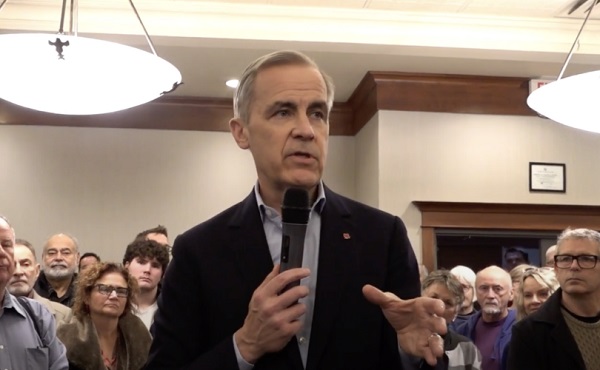Digital Currency
Conservatives urge Canadians to reject mandatory digital IDs proposed by Liberal gov’t

From LifeSiteNews
Canadian federal regulators have disclosed they are working on digital credentials for Canadians despite the fact MPs have repeatedly rejected the proposal over safety concerns.
The Conservative Party of Canada (CPC) called on Canadians to resist and oppose “mandatory digital ID.”
“He’s (Prime Minister Justin Trudeau) trying to encroach on your freedom and privacy, again. The Liberal government has been CAUGHT trying to create a mandatory digital ID,” the CPC said in a recent email to members.
As reported by LifeSiteNews, Canadian federal regulators have disclosed they are working on digital credentials for Canadians despite the fact MPs have repeatedly rejected the proposal over safety concerns.
Shared Services Canada, which is a federal IT department, is developing “digital credentials” like Social Insurance Numbers, which one needs in order to work.
The CPC has launched a petition that anyone can sign calling for Canadians to “oppose” any such digital ID system.
“This Liberal government can’t be trusted to protect confidential information. They have already been HACKED and scammed, costing Canadians hundreds of millions of dollars,” the CPC said.
The CPC noted that Trudeau is “trying to win re-election through TOTAL CONTROL.”
“Canadians do not want more intrusive government surveillance,” the CPC stated.
CPC leader Pierre Poilievre is opposed to digital IDs as well as a federal digital dollar, which seems to be on hold for now, and has promised to introduce a new online harms bill that would “expressly prohibit” digital IDs in Canada.
The Trudeau government is trying to push through laws affecting Canadians’ online freedoms such as Bill C-63 that seeks to punish “hate speech” online.
Censorship Industrial Complex
China announces “improvements” to social credit system

 MxM News
MxM News
Quick Hit:
Beijing released new guidelines Monday to revamp its social credit system, promising stronger information controls while deepening the system’s reach across China’s economy and society. Critics say the move reinforces the Communist Party’s grip under the banner of “market efficiency.”
Key Details:
- The guideline was issued by top Chinese government and Communist Party offices, listing 23 measures to expand and standardize the social credit system.
- It aims to integrate the credit system across all sectors of China’s economy to support what Beijing calls “high-quality development.”
- Officials claim the new framework will respect information security and individual rights—despite growing global concerns over surveillance and state overreach.
Diving Deeper:
China is doubling down on its social credit system with a newly issued guideline meant to “improve” and expand the controversial surveillance-driven program. Released by both the Communist Party’s Central Committee and the State Council, the document outlines 23 specific measures aimed at building a unified national credit system that will touch nearly every corner of Chinese society.
Framed as a tool for “high-quality development,” the guideline declares that credit assessments will increasingly shape the rules of engagement for businesses, government agencies, and individual citizens. The system, according to the National Development and Reform Commission (NDRC), has already played a role in shaping China’s financial services, government efficiency, and business environment.
Critics of the social credit system have long warned that it serves as an instrument of authoritarian control—monitoring citizens’ behavior, punishing dissent, and rewarding obedience to the Communist Party. By integrating credit data across all sectors and enforcing a “shared benefits” model, the new guideline appears to entrench, not ease, the Party’s involvement in everyday life.
Still, Beijing is attempting to temper foreign and domestic concerns over privacy. The NDRC emphasized that the system is being built on the “fundamental principle” of protecting personal data. Officials pledged to avoid excessive data collection and crack down on any unlawful use of information.
Carbon Tax
Mark Carney has history of supporting CBDCs, endorsed Freedom Convoy crackdown

From LifeSiteNews
Carney also said last week that he is willing to use all government powers, including “emergency powers,” to enforce his energy plan if elected prime minister.
World Economic Forum-linked Liberal Party leadership frontrunner Mark Carney has a history of supporting central bank digital currencies, and in 2022 supported “choking off the money” donated to the Freedom Convoy.
In his 2021 book Value(s), Carney said that the “future of money” is a “central bank stablecoin, known as a central bank digital currency or CBDC.”
He noted in his book that such a currency would be similar to current cryptocurrencies such as Bitcoin, but without the private nature afforded to it by its decentralization.
“It is simply untenable in democracies that the core of the monetary system could be based on forms of electronic private money whose creators control large blocks of the currency, like Bitcoin,” he wrote. “Cryptocurrencies are not the future of money.”
Carney noted that a CBDC, if “properly designed,” could serve “all the functions to which private cryptocurrencies and stablecoins aspire while addressing the fundamental legal and governance issues that will, in time, undermine those alternatives.”
Expanding on his worldview in relation to CBDCs, Carney suggested that “fear” can be taken advantage of to shape the future of money.
“With fear on the march, people were willing to surrender to Hobbes’ ‘Leviathan’ such basic rights as the freedom to leave their homes,” he wrote. “And so it is with money. People will support the delegation to independent central banks of the tough decisions that are necessary to maintain the value of money provided the authorities deliver monetary and financial stability.”
Some Canadians are alarmed by the prospect of CBDCs, a fear that only worsened after the Liberals under Prime Minister Justin Trudeau froze hundreds of bank accounts it deemed were importantly linked to the 2022 Freedom Convoy.
During the Freedom Convoy, Carney wrote in an op-ed for the Globe and Mail, “Those who are still helping to extend this occupation must be identified and punished to the full force of the law,” adding that “Drawing the line means choking off the money that financed this occupation.”
Carney is a former head of the Bank of Canada and Bank of England. His ties to globalist groups have led to Conservative Party leader Pierre Poilievre calling him the World Economic Forum’s “golden boy.”
In addition to his comments on CBDCs, Carney has a history of promoting anti-life and anti-family agendas, including abortion and LGBT-related efforts. He has also previously endorsed the carbon tax and even criticized Trudeau when the tax was exempted from home heating oil to reduce costs for some Canadians.
Carney also said last week that he is willing to use all government powers, including “emergency powers,” to enforce his energy plan if elected prime minister.
The Liberal Party of Canada will choose its next leader, who will automatically become prime minister, on March 9, after Prime Minister Justin Trudeau announced that he plans to step down as Liberal Party leader once a new leader has been chosen.
In contrast to Carney, Poilievre has promised that if he is elected prime minister, he would stop any implementation of a “digital currency” or a compulsory “digital ID” system.
When it comes to a digital Canadian dollar, the Bank of Canada found that Canadians are very wary of a government-backed digital currency, concluding that a “significant number” of citizens would resist the implementation of such a system.
-

 2025 Federal Election2 days ago
2025 Federal Election2 days agoCarney’s Fiscal Fantasy: When the Economist Becomes More Dangerous Than the Drama Teacher
-

 2025 Federal Election2 days ago
2025 Federal Election2 days agoA Perfect Storm of Corruption, Foreign Interference, and National Security Failures
-

 2025 Federal Election2 days ago
2025 Federal Election2 days agoCampaign 2025 : The Liberal Costed Platform – Taxpayer Funded Fiction
-

 International15 hours ago
International15 hours agoPope Francis has died aged 88
-

 International11 hours ago
International11 hours agoPope Francis Dies on Day after Easter
-

 Business15 hours ago
Business15 hours agoCanada Urgently Needs A Watchdog For Government Waste
-

 Energy15 hours ago
Energy15 hours agoIndigenous-led Projects Hold Key To Canada’s Energy Future
-

 2025 Federal Election14 hours ago
2025 Federal Election14 hours agoCarney’s budget means more debt than Trudeau’s








